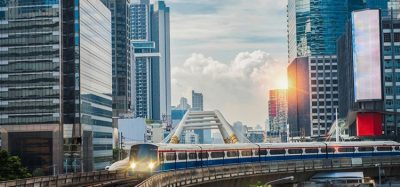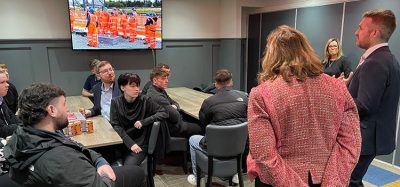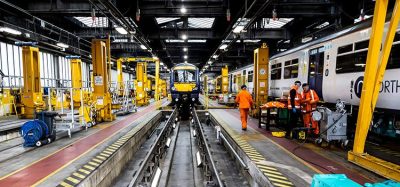“2020 must be the year of rail”: Philippe Citroën, UNIFE Director General
Posted: 3 February 2020 | Philippe Citroën | No comments yet
Philippe Citroën, Director General of UNIFE (the Association of the European Rail Industry), writes that there are several factors the rail industry must focus on during 2020 to prove the value of rail transport and its potential to support a sustainable, interoperable, digital and integrated mobility system.


European rail as the backbone of multimodal mobility
2020 must be the year of rail. Facing a mounting climate emergency and a sustained trend towards protectionism, Europeans require an impactful industrial strategy that will allow them to weather these storms. 2019 welcomed a new European Commission (EC), a new European Parliament (EP), a new Presidency of the Council of the European Union (EU) and the enthusiasm that accompanies a new mandate. Guided by EC President Ursula von der Leyen’s ‘European Green Deal’, delegated to Vice-President Frans Timmermans, there is an opportunity to craft together a path forward that will empower European rail as the backbone of an innovative, sustainable multimodal mobility paradigm that will create jobs across the continent. This objective can only be achieved if the rail industry is supported through robust funding mechanisms and a commitment to a truly level playing field in international trade.
Rail’s carbon footprint
In December 2019, the EC announced their intention to make the EU carbon neutral by 2050 and increase its 2030 greenhouse gasses (GHG) emission reduction target. While the transport sector remains the largest emitter of GHG, responsible for nearly 24 per cent of Europe’s emissions, rail has managed to reduce its carbon footprint while increasing passenger and freight volumes. This is even more noteworthy as the sector is the only one in Europe to have seen an increase in emissions over the past 20 years, according to the European Environment Agency (EEA). As people continue to flock to urban centres, we are in danger of exacerbating climate change if city residents are not provided with efficient rail transportation and, instead, elect to choose road alternatives – European transports’ biggest polluter, that sees 40 per cent of its emissions created in urban and suburban areas. This will require significant investments in new rail projects and research and innovation (R&I) programmes that will make them state-of-the-art.
As people continue to flock to urban centres, we are in danger of exacerbating climate change if city residents are not provided with efficient rail transportation and, instead, elect to choose road alternatives.
UNIFE will work primarily with Transport Commissioner Adina Vălean, who was tasked in her Mission Letter to “put forward a comprehensive strategy for sustainable and smart mobility”, to coordinate how to bring rail into citizens’ lives even more. In her presentation of the initiative to the EP, President von der Leyen stated that shifting “a substantial part of the 75 per cent of inland freight carried today by road … onto rail and inland waterways” would be deliverable to that end. We will continue to stress to the new EC the value of rail transport and its potential for a sustainable, interoperable, digital and integrated mobility system.
The importance of R&I
First, remaining a global leader in R&I will be essential for the swift and effective adoption of sustainable transport solutions, as well as retaining our industry’s global competitiveness. The Shift2Rail Joint Undertaking (S2R JU), a private-public partnership led by Executive Director Carlo Borghini, has been invaluable in this pursuit, as it has contributed greatly to the development of new technologies that will help increase capacity, boost reliability and lower the rail system’s running costs. S2R JU’s collaborative research model has brought together suppliers, operators, infrastructure managers and academics from across the Member States to create a greener, more connected and innovative rail sector. Its extension in the form of ‘Shift2Rail 2’ under Horizon Europe, which is currently under negotiation, would be an impactful step towards even further progress towards a greener, industrial Europe. UNIFE will continue to advocate for this development and recommends widened participation from rail stakeholders (e.g. suppliers, railway undertakings, infrastructure managers, urban operators universities, research centres and Small- and Medium-sized Enterprises), especially from Central and Eastern Europe.
Supporting rapid development
UNIFE’s next step will be to ensure the full transposition of the Technical Pillar of the 4th Railway Package by Member States that have failed already do so by the 16 July 2020 extension deadline. We also continue to insist that rail stakeholders, at both the EU and national levels, support the rapid deployment of ERTMS across the European railway network. UNIFE has worked intensively throughout 2019, and is continuing, to support the European Union Agency for Railways (ERA), chaired by Executive Director Josef Doppelbauer, and the EC as they complete the drafting and adoption of necessary implementing regulations. The subsequent iteration must include Technical Specifications for Interoperability (TSIs) and the creation of the IT Tools that are required under the revised Interoperability and Safety Directives, as needed to complete the new regime by 16 June 2020. These transformations will permit quicker mobilisation of more sustainable platforms on all routes across Europe simultaneously, whilst enabling ERA to become the ‘One-Stop Shop’ needed to simplify this process. Completing these ongoing tasks will make Europe more agile and more interconnected, permitting the smooth and quick adaptation of greener systems that will run more efficiently across the whole network.
A skilled workforce
As our industry represents 400,000 direct and indirect employees, UNIFE is working with CER, led by Executive Director Libor Lochman, to create a ‘Blueprint on Skills’ for the rail industry, which will hopefully be adopted in 2020 by the EC. This will allow the EU to deploy sustainable and efficient solutions for a just energy transition by mobilising skilled young people and providing further training for experienced employees from all walks of life and corners of our union.
The rail supply industry
Additionally, in 2020, UNIFE will continue to champion a green transition by ensuring that European institutions take the necessary steps to empower the European Rail Supply Industry as an engine for this change. We recommend that the measures outlined in the recently adopted ‘European Commission Expert Group Report on the Competitiveness of the EU Rail Supply Industry’ are widely implemented. UNIFE also endorses an ambitious 2021-2027 EU budget stocked with significant allocations for rail projects through Horizon Europe, Connecting Europe Facility (CEF) and the Structural Funds. Furthermore, we will push for the finalisation of the legislative discussions on the International Procurement Instrument (IPI) that will open international procurement markets.
Additionally, in 2020, UNIFE will continue to champion a green transition by ensuring that European institutions take the necessary steps to empower the European Rail Supply Industry as an engine for this change.
Along with an acceptance of the Most Economically Advantageous Tender (MEAT) principle – or the idea that contractors should more holistically evaluate bids based on their qualitative, social and environmental rigor, as well as life-cycle costs – this instrument will create the level playing field that our industry needs to remain competitive and a leader in sustainable rail product creation. We are committed to promoting standardisation and harmonisation as a means of making our sector more streamlined and efficient.
In 2020, the rail supply industry will work to be a driving force behind the Green Deal. UNIFE sees this whole-of-society undertaking as a meaningful opportunity to contribute to the EU’s existential fight against climate change. UNIFE is hopeful, going in to 2020, as we believe that the EC’s expressed desire to confront climate change presents unique opportunities for both the rail supply industry’s growth and the future of our planet.
Philippe Citroën joined UNIFE in 2011. He began his career as Transport Advisor at the French Permanent Representation to the EU, then becoming Member of the Cabinet of the French Transport Minister in 1990. In 1993, he became Manager and Chief of Staff at RATP Paris, and joined the SNCF as Strategy Director in 1999. Prior to assuming his position at UNIFE, he served for eight years as CEO of Systra – one of the world’s leading public transport engineering companies. Philippe is a graduate of Paris II University in Public Law, holds a Diploma from the Paris Institute of Political Studies (Sciences Po) and studied at the Ecole Nationale d’Administration (ENA), where he also lectured about rail and urban transport. Philippe is a member of the Global Railway Review editorial advisory board.
Related topics
European Rail Traffic Management System (ERTMS), Funding & Finance, Multimodality, Regulation & Legislation, Signalling, Control & Communications, The Supply Chain, The Workforce
Related organisations
Community of European Railway and Infrastructure Companies (CER), European Commission (EC), European Environment Agency (EEA), European Union (EU), European Union Agency for Railways (ERA), Europe’s Rail Joint Undertaking (EU-Rail), UNIFE (the European Rail Supply Industry)
Related regions
Related people
Adina Vălean, Carlo Borghini, Josef Doppelbauer, Libor Lochman, Ursula von der Leyen







